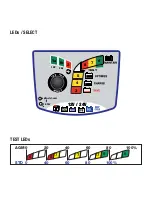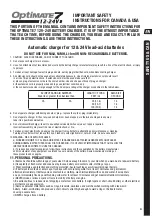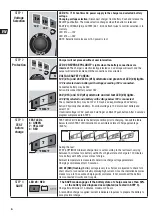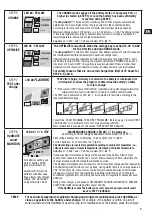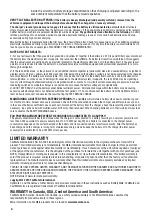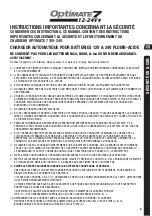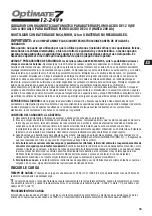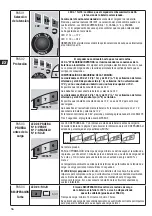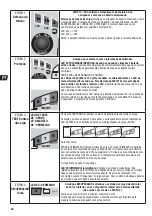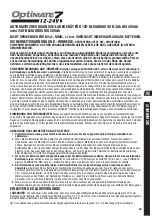
8
inside the aircraft or battery storage compartment so that charging is adjusted according to the
same ambient temperature that the battery would experience.
VERY FLAT NEGLECTED BATTERIES:
If the battery is deeply discharged (and possibly sulfated), remove from the
vehicle or equipment and inspect the battery before connecting the charger for a recovery attempt.
The charger’s recovery mode may not engage if it senses that the battery is still connected to a circuit
which effectively
offers a lower electrical resistance than the battery on its own. However, if the deep-discharged battery is not removed for recovery,
neither battery nor vehicle or equipment electronics will be damaged.
Pay particularly close attention to the following
A battery
left deep-discharged for an extended period may develop permanent damage in one or more cells. Such batteries may heat up
excessively during high current charging.
Monitor the battery temperature during the first hour, then hourly there-after. Check for unusual signs, such as bubbling or leaking
electrolyte, heightened activity in one cell compared to others, or hissing sounds. If at any time the battery is uncomfortably hot to
touch or you notice any unusual signs, DISCONNECT THE CHARGER IMMEDIATELY.
NOTES ON TEST RESULTS:
1.
For any test result other than green #6 (or green #6 and yellow #7 together if the battery is a STD type with filler caps), disconnect
the battery from the electrical system it supports, and reconnect the OptiMate. If a better test result is now obtained, this suggests
that the power losses are partly due to an electrical problem in the electrical system and not in the battery itself. If the poor result
persists, you are advised to take the battery to a professional service workshop equipped with professional equipment for a more
thorough investigation.
2.
If the red LED #8 alone, or the yellow #7 and red LED #8 indicate together (or yellow LED alone for a sealed battery), a significant
problem exists. The red / red LEDs mean that after being charged the battery’s voltage is not being sustained or that despite
recovery attempts the battery was irrecoverable. This may be due to a defect in the battery itself, such as a short-circuited cell or
total sulphation, or, in the case of a battery still connected to the electrical system it supports, the red LED #8 may be signalling a
loss of current through deteriorated wiring or a degraded switch or contact, or in-circuit current-consuming accessories. A sudden
load being switched on while the charger is connected can also cause the battery voltage to dip significantly.
3.
GOOD TEST RESULT, but the battery cannot deliver sufficient power: Permanent damage within the battery may be causing
excessive self discharge that is not detected within the test period of 12 hours. Disconnect the battery from the OptiMate. After at
least 48 hours reconnect and observe the result during the TEST BEFORE CHARGE.
MAINTAINING A BATTERY FOR EXTENDED PERIODS:
The OptiMate will maintain a battery whos basic condition is good,
for months at a time. At least once every two weeks, check that the connections between the charger and battery are secure, and,
in the case of batteries with filler caps on each cell, disconnect the battery from the charger, check the level of the electrolyte and if
necessary, top up the cells (with distilled water, NOT acid), then reconnect. When handling batteries or in their vicinity, always take
care to observe the SAFETY WARNINGS above.
ECO POWER SAVING MODE WHEN THE CHARGER IS CONNECTED TO AC SUPPLY:
The power converter switches to ECO mode when the charger is not connected to a battery resulting in a very low power draw of
less than 0.5W, equivalent to power consumption of 0.012 kWh per day. When a battery is connected to the charger power
consumption depends on the current demand of the battery and its connected vehicle / electronic circuitry. After the battery has
been charged and the charger is in long term maintenance charge mode (to keep the battery at 100% charge) the total power
consumption is estimated to be 0.024kWh or less per day.
LIMITED WARRANTY
TecMate (International) SA, B-3300 Tienen, Belgium, offers this limited warranty to the original purchaser at retail of this
product. This limited warranty is not transferable. TecMate (International) warrants this battery charger for three years from
date of purchase at retail against defective material or workmanship. If such should occur the unit will be repaired or replaced
at the option of the manufacturer. It is the obligation of the purchaser to forward the unit together with proof of purchase (see
NOTE), transportation or mailing costs prepaid, to the manufacturer or its authorized representative. This limited warranty is
void if the product is misused, subjected to careless handling, or repaired by anyone other than the factory or its authorized
representative. The manufacturer makes no warranty other than this limited warranty and expressly excludes any implied
warranty including any warranty for consequential damages.
THIS IS THE ONLY EXPRESS LIMITED WARRANTY AND THE MANUFACTURER NEITHER ASSUMES NOR AUTHORIZES ANYONE TO
ASSUME OR MAKE ANY OTHER OBLIGATION TOWARDS THE PRODUCT OTHER THAN THIS EXPRESS LIMITED WARRANTY. YOUR
STATUTORY RIGHTS ARE NOT AFFECTED.
NOTE: Details at www.tecmate.com/warranty.
copyright © 2015 TecMate International
Optimate 7 and the names of other battery care products mentioned in these instructions such as BatteryMate, TestMate and
TestMate mini, are registered trademarks of TecMate International NV.
WARRANTY in Canada, USA, Central America and South America:
TecMate North America, Oakville, ON, Canada, as a wholy owned subsidiary of TecMate International, assumes the
responsibility for product warranty in these regions.
More information on TecMate products can be found at
www.tecmate.com
.


